#translation of Kikuchi-san's book
Photo
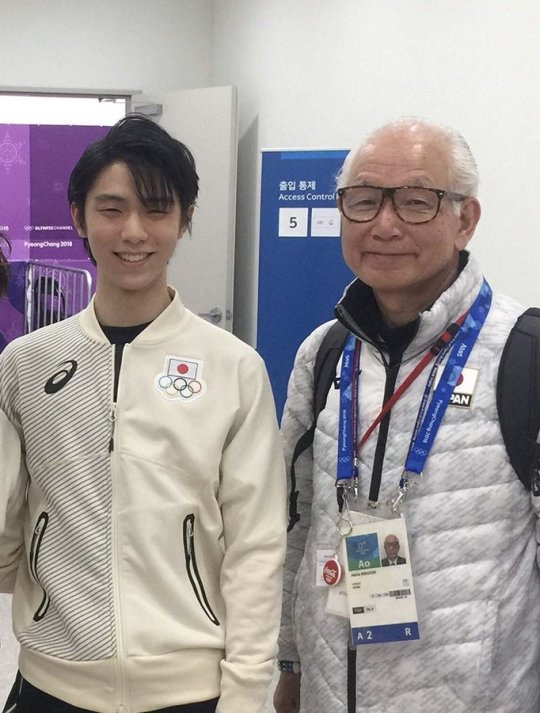
Kikuchi-san’s book, partial translations
Akira Kikuchi is the trainer who accompanied Yuzu to many competitions in the past. Since elementary school days, Yuzu has gone to his clinic in Sendai for therapy sessions after skate practice. Last year (2019), Kikuchi-san published a book titled 'Strongly, beautifully, 30 Methods to train' (my translation from the Japanese title). I read a Chinese translation of some parts. Very interesting to see things from his perspective, and quite touching too, so I decided to translate them to share. Not ideal to translate from another translation but I don't have the book, and usually Chinese fans' translations are pretty reliable.
*paraphrased means I summarised a few lines there.
*more info means I added notes for myself, and it's not from the book.
Chapter 1, part 5. The muscles that were forged after the earthquake.
He became the World Junior champion, and also started school at Tohoku High School, and at the age of 15, Yuzuru made his debut in senior level competition. His 1st competition was Season 2010-11 NHK Trophy in Oct where he landed his 1st quad jump in competition and was in 4th place. 2010 Nov was Cup of Russia in Moscow, where he placed 7th.
(more info: Japan nationals in Dec, he placed 4th. Then 4CC in Feb 2011, he placed 2nd.)
At the end of his first senior season, the Great East Japan Earthquake happened. (March 2011)
When the earthquake occurred, I was working, seeing 4 patients. My home and clinic felt the shaking but were not damaged due to being on higher ground. But very quickly, the electricity, water and gas were cut off.
[paraphrased: Everyone was worried but preferred to stay on.] I continued treating the 4 patients. When they left, I closed the clinic temporarily.
Soon, people whose homes were washed away in the tsunami or destroyed by the quake took refuge in nearby sports halls. When I heard about this, I brought a simple bed into the sports halls and did massages for the people there. That was how I spent each day.
The reason I did this was because I thought of my father that night after the earthquake. He was a policeman and was very strict with himself. He was upright and always thinking of the safety of others. He lived his life for others and he is the man that I most respect. If father was here, he would definitely go to the evacuation centres to do his best to help......
Giving a massage to people at the centre, I was just doing the only thing I could do.
Yuzuru also went through some hard days.
On the day of the earthquake, he went to his usual training rink 'Ice Rink Sendai' after school. It was at the rink that he experienced the "shindo 6" earthquake. (More info: shindo 7 is the highest. See this: robintlewis/what-is-the-japanese-seismic-intensity-shindo-scale. On the Richter scale, this is a magnitude 9 earthquake.)
That child felt the strong shaking and I heard that he rushed out of the building wearing his skate boots. Next to life itself, the most precious thing is his skates. Figure skaters always put skate guards on the blades when they leave the ice, they would never let the blades be exposed. Rushing out without his skate guards, he must have been very scared.
Staying 4 days in the gym of a school which served as an evacuation centre, he seriously thought about whether he should give up figure skating.
It was also figure skating that made him pull himself together.
His home rink was damaged in the quake and he lost his usual training place. His coach during elementary school days, Tsuzuki Shoichiro, inquired about him. Tsuzuki-sensei is the one who gave Yuzuru his foundation in figure skating. Before the quake, he was coaching at a rink in Yokohama.
Subsequently, Yuzuru went to Tsuzuki-sensei's rink to train.
About half a year after the quake, around October, Yuzuru who had returned to Sendai came to my clinic. He told me about what he had been doing.
During that period, he was participating in commercial ice shows and earthquake charity ice shows all over Japan; I knew about this. "For the people affected by the disaster, I want to give them some encouragement," I had read his interviews in the newspapers. In the 5 months after the earthquake, he skated in 60 ice shows throughout the country. "I hope that my activities can become strength for the victims"-- to have this thought, he must have pulled himself together.
"When I participated in ice shows, I could do some training if I arrived early at the venue, and the intervals between shows also became my own training time," said Yuzuru, looking straight into my eyes. (more info: usually there are a few shows at one venue, eg. 3 shows spread over the weekend)
After such an unprecedented earthquake disaster, what had Yuzuru learned, mentally how had he changed, all these I was not sure. But the moment I touched his leg muscles, I immediately felt his efforts and I almost cried.
Since elementary school, I had been seeing him almost everyday. Even a small change in his body I would know.
The muscles forged after the earthquake told of days filled with harsh figure skate training, day after day.
Skating in ice shows "for the disaster areas", and practising fervently in between shows. During the performances, he must have also put in all his efforts so as to "convey something to the people".
Moreover, the muscles developed after the quake were not only those used for jumping, they were also those for bearing the impact of landing.
Landing on the ice after a jump, the impact on the body can be a few hundred times the skater's weight. To withstand such an impact, the muscles around the knees, the gastrocnemius muscles in the calf and the tibialis anterior muscles must be sufficiently trained. If these parts are not strengthened, injury will happen easily.
In a short period of half a year, those muscles grew to such an extent. How much jump practice did he do after the earthquake. Falling down countless times and getting up again. How on earth did he train to develop muscles like that.
Yuzuru's leg muscles are different from other athletes that come to my clinic. His muscles were not developed by specialised muscle training but were formed naturally though figure skating practice. In other words, they are muscles that grew only for figure skating.
Until now, that child still mentions that he "does not know how to ride a bicycle". In my opinion, I think it is because he does not want to develop muscles except those needed for figure skating.
The muscles used for cycling are the same as those for speed skating. Speed skaters have cycling in summer training; bulging leg muscles are necessary for them.For figure skaters, if muscles become big and bulging, the weight can be a hindrance to jumping. But still, strong muscles are needed to do quad jumps and to bear the impact of landing. [paraphrased]
Yuzuru overcame the earthquake disaster and developed muscles for jumping quads and for bearing the landing impact in a good balance.
Those well-trained leg muscles are the external manifestation of his experience of the Great East Japan Earthquake and his determination to fight as a top skater.
- translated by me from this Chinese translation: weibo
-----------------------
Chapter 1, part 6. Overcoming pain in the hip joint
The first time I went along with Yuzuru in the team for a competition was in his 2nd year of senior level, the November 2011 Rostelecom Cup (Russia) in the Grand Prix series. Traveling with a team to an international competition as a trainer, it was the first time for me. Not only that, it was also my first time watching a figure skating competition up close. What a disgraceful old man. Almost everyday I listened to Yuzuru talk about all things related to figure skating but I had never watched his competitions live at the venue.
I saw Yuzuru only at my clinic, diagnosing leg problems, applying tape to stabilise ankles, this kind of interactions, the relationship of a therapist and a patient, I felt this was enough.
I had the role of a 'sports trainer' before, but not for professional athletes. Supporting local high school and junior high students, I was already very content. I had served as 'team trainer' for the swimming, baseball, and track and field teams of Tohoku High and Junior High Schools where sports is very popular, and went with the athletes for competitions.
Once these children graduated, the relationship between trainer and athlete would end. Those who wanted to continue their sports career, some would leave Sendai, some would get a professional trainer to guide them.
"Rostelecom Cup is going to start, Sensei, can you go together with me as my trainer?" Yuzuru asked me. I answered in a relaxed manner, "Oh, alright."
As an athlete, Yuzuru was steadily rising.
"Whether it's an international competition or the Olympics, let me be your trainer and take me along!" This was what I said to him jokingly when he was in elementary school grade 4; I don't know if he still remembers it. But this kind of joke has really come true now, so I was actually feeling rather emotional.
This was also like a commendation from Yuzuru for the treatment he had received so far. "Well, it's just doing the physiotherapy in Russia instead of the usual place in my clinic," this was how I thought at that time.
However, at that Rostelecom Cup, at the official practice, Yuzuru injured his hip joint (the joint between hip bone and thigh bone).
The injury was treated by a trainer sent specially by Japan Skate Federation. I was just Yuzuru's private trainer.
I understood the situation fully when we were back in his hotel room. The treatment for the injury had ended but the pain was still there. I was very sure that it was not suitable for him to do more skating. Even walking would be painful.
"In this situation, it's better to withdraw (from competition), isn't it?" When he heard this, he said with absolute certainty, "Whatever happens, I will compete in Rostelecom Cup." Actually for this competition, Yuzuru must win first place in order to qualify for the Grand Prix Final which is for only the top 6 skaters of the GP series. He wanted to compete, no matter what.
From that moment, I felt for the first time that I have "joined forces with an extraordinary world". Yuzuru was so focused on the competition, "want to compete", "want to win", these desires were way above any pain. As a therapist, of course my advice was to withdraw. But as a trainer, I had to respond to such intense wishes of the athlete.
All I could do was to take care of his hip joint. I also taped his ankle, and then sent him off to compete. I knew the pain of the injury was still there.
But, Yuzuru, he did it....... short programme and free skating both were ranked 2nd, but his total score of 241.66 was higher than other strong rivals like Javier Fernandez and Jeremy Abbott, and he achieved his first victory in the GP series.
At that moment, witnessing it with my own eyes, I was crying. Even though he received treatment, his hip joint injury was quite serious. Any jump would be very painful, especially when landing, he would feel severe pain. In spite of this, for the free skate, he made a mistake only for the quad jump, the other 7 jumps were all successful.
For the first time, I realised it was such a cruel world that Yuzuru was fighting in.
In the spectator stands were many Japanese ladies and they were looking at me with a surprised expression "why is this old grandpa crying so much??" But it did not matter anymore, I did not care how others were looking at me, I was crying my heart out. I was so happy..... really so happy.
That Rostelecom Cup was my first experience as a trainer stepping into the figure skating world.
After this, I did not accompany Yuzuru to any more competitions. I stayed in my clinic treating patients, and sometimes I would treat Yuzuru who came back from travels.
After Rostelecom Cup, Yuzuru rose rapidly at an astonishing speed.
For the GP Final, he was 4th, then at 2011-12 World Championships, it was his first time at Worlds and he achieved 3rd place. At the age of 17 years and 3 months, he broke the record for the youngest World Championship medalist in Japanese figure skating men's history and ascended to the podium.
Then, from April 2012, Yuzuru moved his training base from Sendai to Toronto, Canada.
Before he had overseas competitions, I saw him almost everyday at my clinic. We had been together for the past 10 years. So I would miss him quite a lot.
But it's for becoming stronger that he went to Canada. For greater improvement in figure skating, he made the decision to move to Toronto. He has already "graduated" from my place here.
"Sensei, I'm going off!"
And just like each overseas trip, Yuzuru set off from Sendai, and started on another journey.
- translated by me from this Chinese translation: weibo
This is the book on Amazon Japan: https://www.amazon.co.jp/
(I will share parts from Chapter 2 soon.)
209 notes
·
View notes
Text
Haikyuu!! TV Anime Team Book vol. III translation: Shiratorizawa voice actor dream teams
This is a fun little tidbit from the otherwise not very informative team book. Here we go...
***
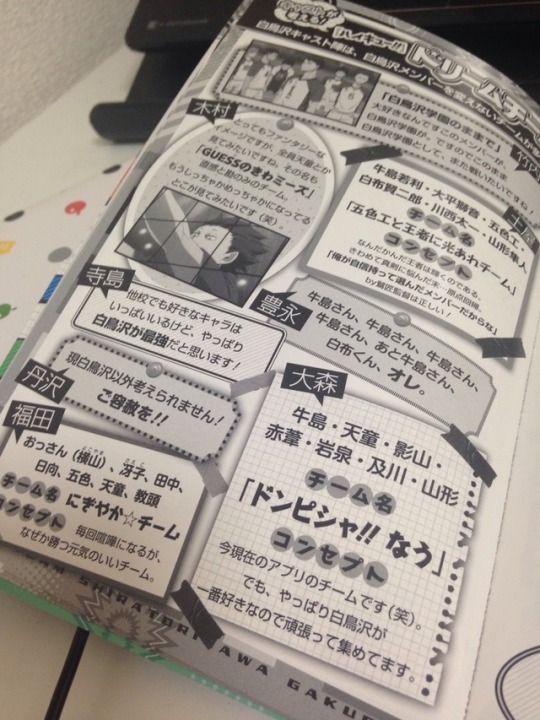
The cast consider their Haikyuu!! dream teams! A lot of the Shiratorizawa voice actors don’t want to change their team.
***
Takeuchi (Ushijima): Just keep them as Shiratorizawa Academy. I really love these guys, Shiratorizawa Academy. So I want to keep them like this, and have them fight again as the same Shiratorizawa Academy!
***
Kimura (Tendo): This is a very fantastic scenario, but I want to see what it would be like if everyone was Tendo. They would be called the “Guess Extremes”, a team based on sense and intuition. I want to see how messy this would be (he laughs).
***
Tsuchiya (Goshiki): Wakatoshi Ushijima, Reon Ohira, Tsutomu Goshiki, Kenjiro Shirabu, Taichi Kawanishi, Hayato Yamagata. Team name: “The Tsutomu Goshiki and royalty team where there is light”. The royalty shines, somehow. After considering this carefully... I returned to the basics. “This is the team I chose with great confidence, after all,” by coach Washijo is correct!
***
Toyonaga (Shirabu): Ushijima-san, Ushijima-san, Ushijima-san, Ushijima-san, another Ushijima-san, Shirabu-kun, ME.
***
Terashima (Semi): There are many characters I like from other teams, but I think Shiratorizawa is the strongest after all!
***
Tanzawa (Reon): I can’t think of anything besides Shiratorizawa! Forgive me!
***
Fukuda (Yamagata): The old man (Yokoyama), Saeko, Tanaka, Hinata, Goshiki, Tendo, the vice principal. Team name: The lively team. Concept: There would break out fights every time, but they would be energetic and win, somehow.
***
Omori (Kawanishi): Ushijima, Tendo, Kageyama, Akaashi, Iwaizumi, Oikawa, Yamagata. Team name: Donpisha!! Now. Concept: This is the team I currently have on my game app (he laughs). But I do like Shiratorizawa the most after all, so I’m trying my best to gather them.
***
Bonus: Kikuchi, a random voice actor on Fukurodani who voices Komi, also chose an all-Tendo team, the Guess Monsters!
#haikyuu!!#shiratorizawa#stz translation#tendou satori#shirabu kenjirou#tendo#shirabu#you other guys are kinda boring no offense#also goshikis va is a traitor#same kawanishis va#same
218 notes
·
View notes
Photo
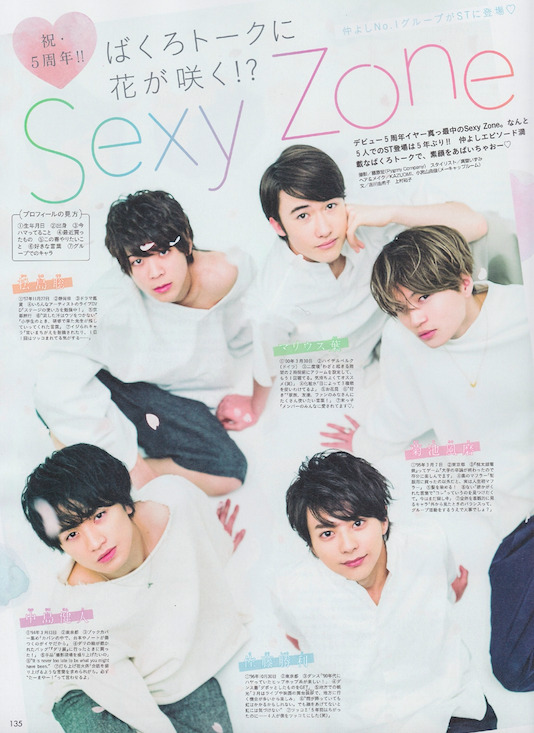
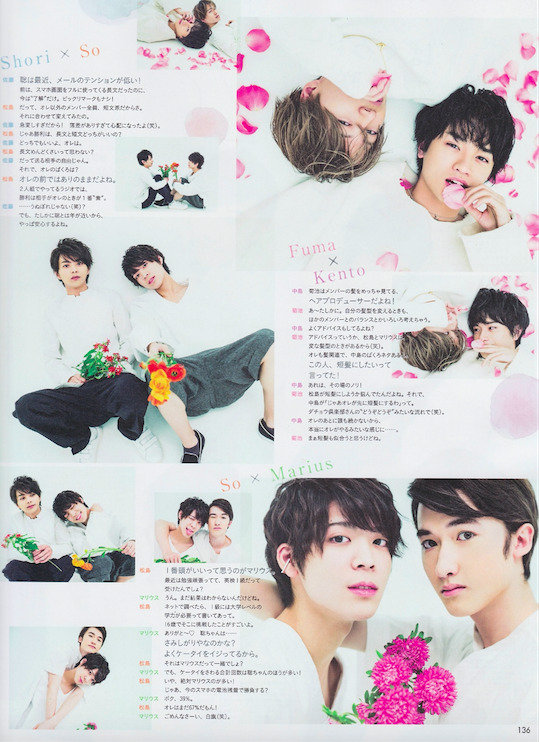
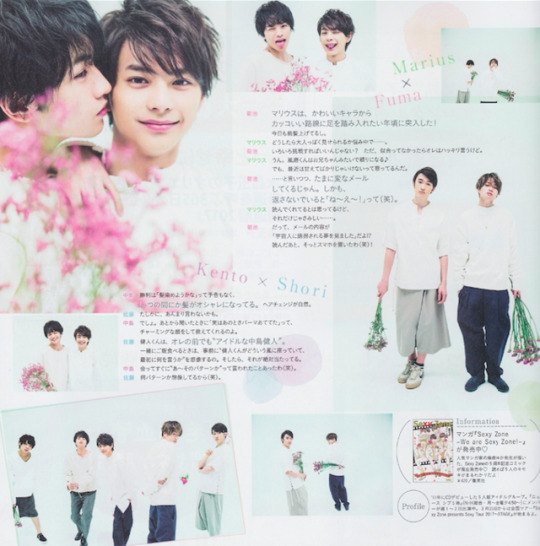
🌸Sexy Zone, revealing things about each other🌸
Profile questions:
Q1. Birth date
Q2. Birth place
Q3. Something I’m addicted to right now
Q4. Something I bought recently
Q5. Something I’d like to do this spring
Q6. My favourite quote
Q7. My character within the group
Matsushima Sou:
A1. 97/11/27
A2. Shizuoka
A3. Watching dramas
A4. Many concert DVDs so I can learn from their performances
A5. A trip to Kyoto
A6. „Every effort will surely be rewarded“. When I was in elementary school, a teacher told me these words.
A7. The one who is easy to make fun of. I often get corrected when I do mistakes and I feel like I get teased at least once a day.
Sato Shori:
A1. 96/10/30
A2. Tokyo
A3. Dancing. Especially to hip hop music from the 90’s!
A4. A dancing outfit. I got baggy clothes.
A5. Explore other regions. I am promoting my movie and having performances in March so I’m looking forward to going to many different places.
A6. „Even if it’s raining a rainbow might appear. But if you don’t hold your head high you won’t notice the rainbow.“
A7. Making witty comments. Five years ago it was different... the other four members were the ones who made witty comments about me (laughing).
Nakajima Kento:
A1. 94/3/13
A2. Tokyo
A3. Collecting book covers. Because when I carry scripts and notes in my bag, I don’t want them to get damaged.
A4. A bag with a painting of Dali printed on it. I bought it when I went to see a Dali exhibition!
A5. Magic tricks. While being at a shooting location I want to lift up the mood.
A6. „It is never too late to be what you might have been.“ (t/n: he said that in English)
A7. A skyrocket. Someone who tends to lead exciting conversations. It always makes everyone go „Wow!“
Marius Yo:
A1. 00/3/30
A2. Heidelberg (Germany)
A3. Going back to sleep after waking up. I set my alarm clock two hours before I need to wake up on purpose, so I can go back to sleep one more time. It feels good so I recommend it (laughing).
A4. Face lotion. I use three different types during the day.
A5. Hanami.
A6. „I like you.“ To family, friends, the fans, I want to use these words a lot!
A7. The youngest child. I’m loved by all members♡
Kikuchi Fuma:
A1. 95/3/7
A2. Tokyo
A3. A game called „Momotaro Dentetsu“. Since I finished my bachelor’s degree thesis now I’m enjoying it to the fullest.
A4. A black muffler. Other than buying them to use them with school uniforms, actually this is my first muffler ever.
A5. Dye my hair!
A6. None. I want to find a certain something through someone’s words. I’m still looking for it.
A7. Someone who sees things objectively. It’s important that there’s a balance within the group created by someone who is looking from the outside.
Shori x Sou
Shori: Recently, Sou’s text messages became short! Before that, his long sentences filled up the whole phone screen but now he texts only „Okay“. There isn’t even an exclamation mark!
Sou: That’s because all the members except me use short sentences. So I changed it to fit in.
Shori: The change is too sudden! I became worried because your writing was too different (laughing).
Sou: Well Shori, do you prefer long or short sentences then?
Shori: Either one is fine with me.
Sou: Don’t you think that long sentences are bothersome?
Shori: My partner should be able to send me whatever they want. So, can you reveal something about me?
Sou: In front of me you are like you usually are. When the two of us are on the radio, Shori is being his „natural“ self in front of me.
Shori: ...aren’t you conceited? (laughing) But since I’m close to Sou in age, certainly I feel at peace with him.
Fuma x Kento
Kento: Kikuchi is often looking after the members’ hair so he’s the hair producer!
Fuma: Ah~ certainly. Even when I change my own hair style, I think about balancing it with the other members.
Kento: You often give advices too, right?
Fuma: I gave advices to Sou and Marius when they had a strange hair style (laughing). Related to hair, I have something to reveal about Nakajima. That guy said he wants to have short hair!
Kento: What’s with this situation’s mood!
Fuma: We were worried about Matsushima having short hair. So Nakajima said „Well, then I’ll have short hair first“. It was like Dachou Club-san’s „Douzo douzo“ (laughing).
Kento: Since no one continued after me, I really wanted to try it...
Fuma: Well, I think short hair would suit you too.
Sou x Marius
Sou: I think that Marius is really smart. Recently you’ve been studying hard, you even did the highest level in an English proficiency exam, right?
Marius: Yes. But I still don’t know the results yet.
Sou: After looking it up online, I read that in order to do that level, you need university level knowledge. It’s amazing that you challenged that at 16 years old.
Marius: Thank you~♡ Sou-chan... are you lonely? Since you’re often on your phone.
Sou: Am I not always together with Marius?
Marius: But Sou-chan is always playing with his phone!
Sou: No, Marius is always the one playing on his phone! Well, should we check who has more battery left on our phones right now?
Marius: Mine is at 39%.
Sou: Mine is still at 67%!
Marius: I’m sorry, I lost (laughing).
Marius x Fuma
Fuma: Marius is entering an age now in which he wants to change from having a cute character to start walking the path of being cool! Today he has even put up his bangs.
Marius: I’m in the middle of trying to figure out how to look more adult-like...
Fuma: Why not try out different things? However, I will tell you clearly if something doesn’t suit you.
Marius: Yes. I can rely on Fuma-kun who’s like my older brother ♪ But recently, I think I don’t want to have a spoiled character only.
Fuma: ...now that you’re saying that, sometimes you send me weird text messages. And when I don’t reply to them, you go like „Ne, neee~!“ (laughing).
Marius: I see that you read them but I feel lonely (if you don’t reply)...
Fuma: That’s because your messages contain things like „I had a dream in which I was abducted by aliens“!? After reading that, I simply put my phone away (laughing)!
Kento x Shori
Kento: Shori didn’t say something like „I wonder if I should dye my hair“ before, he just did it and without telling anyone his hair became stylish. His hair change was natural.
Shori: Yeah, I didn’t say much.
Kento: Yes. When I heard about it later, you told me „Actually I got a perm then“ with a charming look on your face.
Shori: Even in front of me Kento-kun is the „idol-like Nakajima Kento“. Before we went out together for a meal, I was imagining things like „How is Kento-kun going to show up, what should I say to him first“. Then I totally impressed him.
Kento: As soon as we met, he said „Ah~ looks like usual“ (laughing).
Shori: Because I was imagining how you’re going to show up (laughing).
Keep in mind I am not a native speaker therefore there might be mistakes in my translations. Also I’m not exactly translating word for word. Feel free to correct me in my ask box any time you want, I’d appreciate it! I apologize if someone already translated something before me and I didn’t notice, I hope you don’t mind.
If you’d like to show me a bit of support, leave a nice message through my tumblr ask or a small donation by clicking on the link down below ♡
→ Click here to buy me a mango!
#translation#sexy zone#kikuchi fuma#nakajima kento#sato shori#matsushima sou#marius yo#seventeen 201704#翻訳#セクゾ#中島健人#菊池風磨#佐藤勝利#松島聡#マリウス葉#shorisou
747 notes
·
View notes
Photo
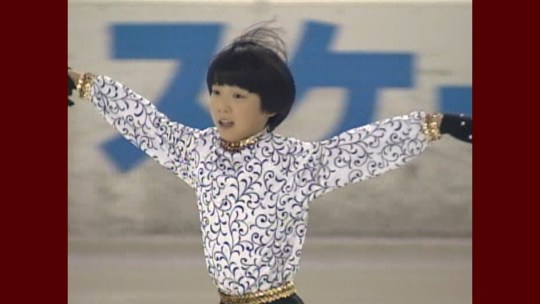
Continuing to translate Kikuchi-san's book ‘Strongly, beautifully, 30 methods to train’ (book on amazonjp)
Chapter 1, part 3. Adjusting the body's axis during a jump
As Yuzuru the athlete's body continued to grow, the content of our conversation during massage also changed a little.
For example, elementary school 4th grader Yuzuru asked me about taking in water during training and competition.
"Sensei, during training and before a competition, how should we drink water?"
"In our days, no matter how thirsty we were during training, we could not drink water. But that approach is incorrect. Now for all of you, staying well hydrated is crucial," I explained and he listened with great interest.
"Oh? Then can I drink it all up at once?" he said.
"No, no, you can only drink what your body can absorb. If you exceed that amount, won't the water be churning in your stomach? Then you won't be able to jump," I answered. "First, take a sip to moisten your mouth, then take 2 sips; if your throat is still thirsty, you can only take one more sip," I taught him.
There were also questions related to competition.
"Before the 6-minute practice, what is a good way to warm up?”
For figure skaters, just before the actual competition, there is a period of 6 minutes for practice. At that time, I didn't know anything about it, but I have the experience of practising Shorinji Kempo (t/n. Japanese martial arts inspired by Shaolin Kungfu), so I used the warm-up for martial arts as a guide to answer him.
Looking back now, figure skating and martial arts are 2 completely different events..... I had done a very careless thing. But still, Yuzuru was responding "mm" and listening attentively.
Another time, I talked about jumping, Yuzuru looked very interested and listened to me quietly.
"When you jump, your legs must stretch fully and straighten...... (t/n. I just translated the first and last few lines of his jumping theory)..... To use the reaction force from the ground effectively, the axis must not drift. If your legs are fully straightened, the axis will not be off. Therefore, the hip joint and the ankle must be in a straight line."
These words made Yuzuru's eyes light up.
To be honest, it was all about jumping on land, totally different from jumping on ice in figure skating. I realised it after a while and kept quiet.
The great thing about this child is that he can think independently. He can analyse my words in his own way, "stretching my legs straight, is that a good way to jump on ice", he can digest it for himself. For an elementary school child, it's rather amazing.
When he entered Tohoku High School, he said this to me, "When I was in elementary school, the jump knowledge sensei taught me, it's the theory for jumping on land, right?"
"Actually, at that time, I also thought it should be different for figure skating jumps," I could only reply like that.
"But what you told me at that time, to fully straighten my legs, I think I found the feeling," he said.
That child always took my words and tried to understand in his own way, always thinking about how to do it in order to use it for himself.
(t/n. rest of this section is about exercise methods and theories, not translated)
(pic of 4th grader Yuzu above, credits: unknown)
Chapter 1, part 4. Dashing onto the world stage
When Yuzuru started middle school (junior high), travels clashed with training time, so he had to "graduate" from 'torso training class'. But during his elementary school period, the body torso and other necessary abilities had received continuous exercise, to a certain degree.
He participated in 'abilities exercise' every week. I instructed him on "the need to pay attention to the central axis when moving the body". His body's axis became stable, unnecessary movements decreased, and his sense of balance also became better.
Also, I often had him do the training of making different actions according to the signals; the muscles and joints respond quickly and appropriately to information entering the brain through sight (eyes) and hearing (ears); this also helped to raise the senses.
But I instructed other children in the same way too. Yuzuru was different from others in that, from elementary school age, he was sensitive to words like "become stronger", "become better", "win". Perhaps we can even call it 'greed'.
And also, he was very open and frank. The desire to excel at figure skating, to be stronger, to win.... His awareness was so strong. As a result, he listened earnestly to even someone like me who had no knowledge of figure skating. In my words, he searched for any tiny bit that might help him improve.
In junior level, his competition awareness was already very strong.
When he was 15 years old, before he won the Junior World Championship, he told me, "I must win Junior Worlds." He continued, "The competition standard will be very high, so I definitely want to win."
That child had just won the Junior Grand Prix Final, but he was not satisfied with just that.
Before Junior Worlds, he injured his knee. So he asked me to teach him how to do taping, I naturally taught him all that I could.
Even though his competitions are now on the international stage, he still came to my clinic when he returned and after daily training, getting treatments like massage, tui-na, taping and such.
When I saw him at those times, he was just an ordinary boy. Once, I helped to remove the tape around his injured instep, he said, "Sensei, the pain is gone!" and was happily dancing around. He was boasting a little. (t/n. seems like he was boasting about his own abilities because he had done the taping himself.) So I jokingly said, "I can't do this job anymore!" Hearing my words, he pouted his lips. He was already fighting his battles on the world stage, but in front of me, he was just an ordinary junior high student.
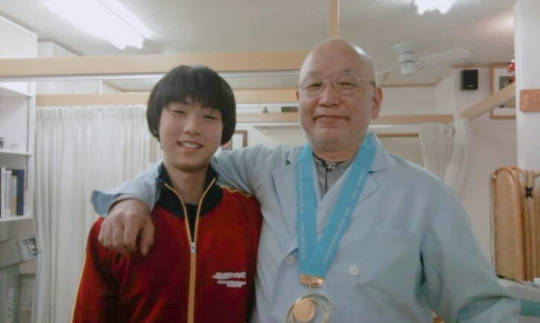
Photo: Kikuchi-san is wearing the Junior GPF 2009 gold medal. :) Yuzu had just turned 15 in this photo and had just won the competition which was held in Tokyo that year. (pic credits: unknown)
I don’t have the book yet so I translated from a Chinese translation in weibo, much thanks to QuailAries. (I left out 2 or 3 sentences; they do not affect the meaning and flow of the section.)
Next parts, 1.5 and 1.6, were already posted earlier (cos I translated them first).
#translation of Kikuchi-san's book#Akira Kikuchi#Yuzuru Hanyu#corrected one part: he practised Shorinji Kempo which is based on Shaolin Kungfu
164 notes
·
View notes
Photo

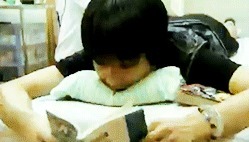
Translation of Kikuchi-san's book. A friend shared the earlier parts of the Chinese translation with me, so I decided to start from the beginning. Little Yuzu is too adorable. :))
Chapter 1, part 1. On the balance beam, a special boy.
If there are natural inborn qualities, then for Yuzuru, that would be the "ability to attract people".
Yuzuru came to my clinic for the first time when he was in elementary school 2nd grade; he had sprained his ankle because of jump training. When his ankle healed, he started to come for "torso training class" that I conducted.
The Yuzuru exercising in the gym, and the Yuzuru talking non-stop in the clinic, are like 2 different people.
Firstly, his body movements are completely different from the ordinary child. His body posture is very good, and there is a flow in all his movements..... Perhaps these are also the special qualities of a figure skater.
For example, his running. Usually when children want to run fast, even if the posture is good, the legs will make uncontrolled heavy steps. But Yuzuru ran lightly and rhythmically. And it didn't slow down his speed. The way he ran gave a gentle and graceful feeling, there's always something that draws your attention. "What an interesting little fella," he left a deep impression on me.
But, in my training class, he wasn't so enthusiastic all the time. Although he was working hard at figure skating, he often slackened for training in the gym. Like running with not much power, or being sluggish with exercises, I often had to hold up the shinai (t/n. light bamboo sword for kendo practice) and roar at him. When I did that, Yuzuru would yell, "Waa~~ no!!!!" and start running to escape. Chase battles like this between us were always going on. (t/n. so funny!)
Another area that made me feel "this little fella is really interesting" was during circuit training. This is a way of training by combining a few different items like running, hurdles and simple jumps. It is an effective exercise for the respiratory system, so I often get the children to do it.
That day, the last item was walking on the balance beam.
For Yuzuru with his well-developed motor nerves, he walked across the beam too easily; this was uninteresting to me. "What? You simply walked across? What sport are you training for? Don't you have to show beauty? So do it!" I gave ridiculous instructions like that.
He started to walk on the beam while making figure skating poses. Standing around watching him were some children who were quite mischievous. To be made to do figure skating poses and movements in front of everyone, normally you would feel that you're being made fun of, and feel conflicted.
However, Yuzuru confidently and naturally showed signature figure skating moves in front of his peers. In this sport of figure skating, if you feel embarrassed by the movements or the costume, you will not be able to keep going. Especially for a boy.
But Yuzuru is like the main character that draws attention, in the good sense of the word. And in his posture and movements, there is some power that strongly attracts you.
Watching him do all those skating poses, "Ah this child must really be in love with figure skating, from the bottom of his heart," I thought.
How much do you love what you are doing? Not just for figure skating, but for any situation, that is the best short-cut that leads to progress.
Chapter 1, part 2. Growing kids are "good at making requests"
Yuzuru trained at Konami Sports Club, Izumi Ice Rink (the current Ice Rink Sendai); after training, he came to my clinic, it's something he had to do everyday.
If there was a problem with any part, I would treat that part. If there was no pain anywhere, I would do a massage for him and taping. Besides this, he also participated in the 'Sunday night training' in the gym, so I saw Yuzuru almost every day.
Initially he was quiet and spoke few words, but before I knew it, he had already become very talkative. But most of what he said were related to figure skating.
"Axel is like this, Loop is like that," he would be telling me endlessly as I was treating him. I had no concern for figure skating at all, so I could only say, "I don't understand all these things you are saying!" "Be quiet and receive the massage properly!" But still, he went on and on by himself. From that time, in that child's head was figure skating only.
We saw each other almost daily, but I had never heard him say "I want to play" or "I want to stop skating", these sort of complaints.
When Yuzuru was in lower elementary school, I think because of a large amount of figure skate training and also the thought that it's a girl's sport, he told his family, "I want to play baseball," but he had never said such things in front of me.
(*notes by me, not from the book: In his autobiography, Yuzu said whenever he told his parents he felt like playing baseball instead of skating, they always said OK but he himself never made the switch in the end.)
Elementary school students will naturally talk about TV games and manga. But at that time I never heard him talk about these topics. I heard him say he watched TV, so I asked him what programme. Turns out, he was just watching a video of Plushenko's performances. And he watched it over and over again everyday, until the video tape was worn out and could not be played anymore.
Yuzuru came to my clinic after training ended, always at night. I had to extend the opening hours of my clinic. Everyday, my clinic was open until late, waiting for Yuzuru to come over.
"Sensei, tomorrow I will come again after training, is that alright?" requested this 3rd or 4th grade child, looking very apologetic.
If parents asked me this, I could still refuse in some way, but to an elementary school kid, I could only reply, "Okay! I will keep my clinic open and wait for you, just come over."
To a child working hard, I wanted to give a helping hand in any way, I guess it's quite natural to have that thought. And without me realising, I started to look forward to his arrival each time.
From here we can also see, from that young age, Yuzuru was already very good at making requests.
But it was not only Yuzuru who was working hard. From his home to my clinic, he came by car. Bringing him here always, was his father.
And also, I heard from Yuzuru himself, that his mother and sister worked on his figure skating costumes, sewing on glittering crystals one by one, late into the night.
After hearing this, all the more I wanted to support him.
2004 October, All-Japan Novice B Championship that elementary 3rd and 4th grade students participated in (9-10 years old), Yuzuru competed in this for the first time and won the championship. As a skater, he was growing well.
Not only Yuzuru, the children who joined the Sunday night torso training class were all "good at making requests", all full of enthusiasm, they made me want to support them from the bottom of my heart.
(t/n. awww........ Kikuchi-san is really a kind and soft-hearted grandpa.)
Translated by me from a Chinese translation by QuailAries@weibo, much thanks to her. Please consider buying the Japanese book to show your appreciation: HERE. I have just placed my order.
(pic: screenshots from gif by redfar@tumblr)
#Akira Kikuchi#Yuzuru Hanyu#update: I amended some parts after reading the original Japanese book#but no major differences in meaning
162 notes
·
View notes
Photo
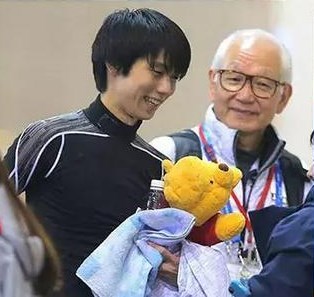
Continuing Kikuchi-sensei's book 'Strongly, beautifully,....'
Chapter 3
3.4 Looking at deviations of the torso
3.5 Icing as a recovery method
(not translating these 2 sections; I may come back to do them after I have done the parts that interest me most.)
3.6 Experiencing the world's stage as trainer
The season after Sochi Olympics, that is, 2014-15 season. It was hard for Yuzuru to get into good condition. The 1st competition, Finlandia Trophy, he withdrew because of back pain. Yuzuru was in Canada and I did not know of his injury. I only knew about it from the news.
But, one week before GP series Cup of China, held in November 2014 in Shanghai, I received a message on my smartphone.
"Sensei, can you come to the competition in Shanghai please?"
"Didn't you say that the Canadian trainer will accompany you?" I replied.
After a while,
"Sensei, come to Shanghai and do treatment for me please....?"
Because in the previous season, he had told me, "For competitions in Japan, please may I have your care, but for overseas competitions, the trainer in Canada will go with me, is that alright?" Perhaps he felt a sense of guilt. He was probably fiddling with Pooh-san's ear and hesitating for some time before sending the message.
"Alright, I understand. I will be there," I replied. I cancelled all my plans for the week ahead and went to Shanghai.
After a long absence, when I touched his legs, I felt the confirmation of his evolution, and also, in my heart, I felt some sense of relief that I could do treatment for Yuzuru again.
2014 December, GP series NHK Trophy in Osaka. Yuzuru, far from ideal condition, headed for competition. His short programme was only 78.01, and with scores lower than any he had in recent time, he finished in 4th place. He managed to qualify for the GP Final in Barcelona which was for only the top skaters of the GP series.
Right after NHK Trophy was over, Yuzuru came to my hotel room.
"Sensei, can you also come with me for the Final?" he said.
"Oh? For Europe, the other sensei (Canada) will go with you, didn't you say that?" I was also being mean.
"But, sensei,........" his eyes made the plea.
"Ah, seems like it's unavoidable, shall I go to Spain and see Sagrada Familia as well?"
In this way, I was called back to be Yuzuru's personal trainer.From then on, for competitions in Japan and overseas, support for Yuzuru was done by me. Well, to him, I think it's because he has known me since he was little, and calling me "sensei, sensei" is easy and comfortable. But to me, it became a major event that happened in my life.
3.7 PyeongChang Olympic season, starts
2017-18 season, also an Olympic season. First competition, Autumn Classic, Yuzuru had a world record score of 112.72 for his short programme, breaking the previous record which was held by himself. The media, in anticipation of a 2nd Olympic gold, saw it as a good start towards PyeongChang Olympics, but......
After Autumn Classic, I met Yuzuru; his body that had been loaded with training, headed for competition at GP series Rostelecom Cup, could not be said to be in very good condition.
That not-ideal condition indicated the pressure of a 2nd Olympic win. In summer, he was pushing himself hard and the body was very overworked. The thoughts of 'must win' put a great burden on his legs. Putting multiple quadruple jumps into his programme layout was extremely demanding on the ankles.
I thought it was not so hard to win at PyeongChang Olympics if he maintained the level of record-breaking 2015-16 NHK Trophy and GPF. It seems his coaches also told him "you don't have to overdo it to that extent".
But, Yuzuru thoroughly pushes himself hard. "Not doing it, is not me" he says and continues to practise so that he can raise the level. Even if someone said "stop!" he would still continue to skate.
The Olympics becoming a heavy burden, there was not a single word of this from Yuzuru's mouth. He did not show it even in his behaviour. But when I touched his legs, I knew. To what extent was the harsh training he had put in.
For Yuzuru who has an overabundance of fighting spirit, I felt a sense of uneasiness. Unfortunately, my premonition came true. 2017 November, GP series NHK Trophy in Osaka, during official practice, he fell on a quad lutz. The ligaments of his right foot were damaged.
After he was injured, we were talking and joking and laughing. If we did not keep the mood cheerful, Yuzuru would be too pitiful. When he fell, I knew it was a serious injury. If it was the usual sprain, my treatment could help in some way. But not this time. Yuzuru had to withdraw from NHK Trophy. The trainer from Canada and a doctor took care of him and I returned to Sendai.
A long recovery period was needed for his foot. He was absent for Japan nationals. He remained in Toronto, undergoing treatment, and prepared for the Olympics. I could not be at peace. The condition of his injury, I only knew about it from the news, as usual.
It was about a month and a half before PyeongChang Olympics. Yuzuru's father, holding a form for registering the size of sportswear and blazer for the Japanese delegation, came to my clinic. Same as 4 years ago for Sochi Olympics. "How is Yuzuru?" I asked, but Yuzuru's father only smiled and nodded, as he always does.
But it was definite that Yuzuru would compete at the Olympics. What I could do was, no matter what the situation, to send him into the rink in the best condition. And I was ready.

3.8 Do carefully one by one
The free skate at PyeongChang was at an earlier timing than the usual competitions, and the practice started from 8.25am. Without getting all worked up like at Sochi, I could face it calmly this time. That morning, the taping for him was completed at first try.
Yuzuru did not say anything. Of course, his foot could not be said to be in very good condition. My role was to help him get the ideal feeling that he wanted in his legs and I believe it went very well. Warming-up also had no problems.
Supporting Yuzuru's beautiful performances are his well-trained body and senses. Elegant jumps and spins are created by his steady torso and ability to sense tiny differences. These are important for flowing movements. That is why Yuzuru is always concerned about the training of the torso and any deviations.
And so, about one year before PyeongChang Olympics, torso awareness training was introduced into the warm-up schedule. There was a video showing Yuzuru sitting on a bucket with wheels and moving around; that was one of it. People who saw it may have thought, "What is he playing?"
That is a custom-made product, a bucket-shaped chair fitted with wheels used for wheelchair basketball. To move around freely on it, one has to be very conscious of the transverse abdominal muscles that surround the abdomen, the erector spinae muscles that support the spine, and other such parts of the torso; it is a training device. It is well-known that the balance ball is effective for conditioning the torso. However, it is not enough for a torso that supports the flowing movements of figure skating. Quadruple jumps do not go directly above the head. They go forward 3 to 4 metres while rotating. And so, (thinking) can't we condition the torso while moving forward, backward, left and right, this bucket-chair was developed.
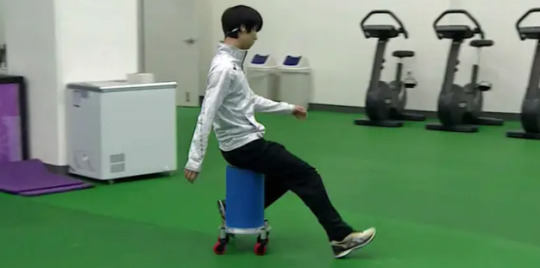
Usually I would say "next, bucket", and Yuzuru would sit on it and move around, like writing the character "ハ" (t/n. this is number 8 in kanji). At the warm-up of the short programme, he jokingly said, "Sensei, I've become good at this." For the free skate warm-up, even though I did not give the instruction, he himself went to sit on it and started moving around quietly. What he did was exactly the same as how I had pictured it in my mind.
As he often says, "When I am focused, I know very clearly what I need to do."
The last part of warm-up was always, still in gym shoes, jumping straight up with rotations on the spot. Doing this, one will know if there is any shift in the body's axis.
At this time, I once again felt "this guy is incredible..." and got goosebumps all over.
In the tension, there must have been countless times of feeling almost crushed by the considerable pressure. Nevertheless, he spent his days pushing himself hard, and studying and researching all that he could. And raise himself higher, refine his skills, brutally overwork his body...... 4 years of it, for the sake of this moment.
Perfectly conditioned. To Yuzuru who was heading to the middle of the rink for his free skate, the only thing I could do was to say, "(You're) alright, so just do carefully one by one." But I don't know if he heard me.
[end of chapter 3]
[some sentences are left out or summarised]
Translated by me from this Japanese book by Akira Kikuchi: https://www.amazon.co.jp/%E5%BC%B7%E%… (please consider buying it, if you can)
(photos: searched from internet)
135 notes
·
View notes
Photo
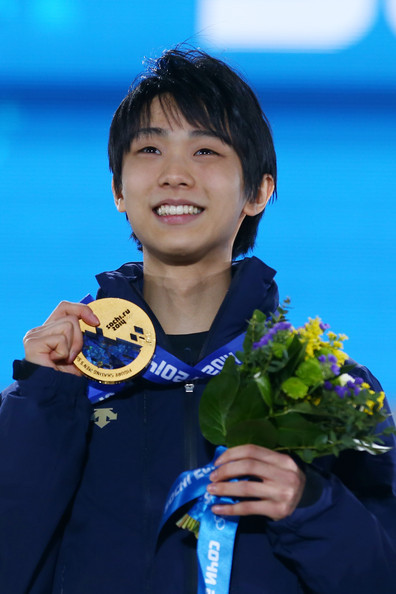
Continuing Kikuchi-san's book 'Strongly, beautifully,....'
If you have not read the earlier parts, please read them first. See my previous posts in tumblr, OR the master post on FB.
Chapter 2, part 6. The gold medal that the goddess smiled upon.
I was at the rink side, holding Yuzuru's luggage, watching his free skate performance. He fell on his opening jump, the quad salchow. Another jump also had a mistake. In the 2nd half of the programme, he was running out of stamina and he finished a performance that was far from the original.
He returned looking very dejected and mumbled, "Gold medal is finished." I myself could not say a word. Waiting for the score at the Kiss&Cry, Yuzuru did not show much emotions.
The confirmation of Yuzuru's gold medal happened later, during the interview with the media. Both Yuzuru and I thought it would be a silver medal, but Patrick Chan who skated after Yuzuru, did not get a score that could take him ahead, and thus, the gold medal went into Yuzuru's hands. Surely, it was a moment where a goddess smiled at Yuzuru.
"I am first...... I'm really surprised. I'm not satisfied with my performance today....."
Yuzuru who was being interviewed by the media from various countries, looked a bit confused. As for me, I was putting ice on his feet, doing icing, and my tears were falling. Of course, this was because I was so happy that he had won the gold medal. However, from the time the free skate ended, he had never looked satisfied with the title of Olympic champion.
To him, the gold medal that he won at 19, is only one of the checkpoints. What he desires is to succeed in a technique that no one has done before, such as the quad axel jump. And even more, to do a perfect performance with no mistakes.
In that sense, it was a failure, the Sochi Olympics that he had envisioned in his mind. He was not intoxicated by the euphoria of the gold medal; the period when he was in Sochi, whenever he found some time, even if it was just a bit, he went to the rink to practise.
-------------------
For Parts 7 and 8 of Chapter 2, I did a partial translation, some sentences are summarised or left out.
Chapter 2, Part 7: Start of new battles
During the Sochi Olympic period of about one month, my clinic was temporarily closed for business. As such, it was tough financially. Although before the Olympics, 'okachan' (wife) had said, "Going around the world is one of otosan's dreams, just go if you want to," and sent me off, I think it was hard on the household budget. After the Olympics is over, this role as Yuzuru's trainer will end and I will treasure the time I have with okachan, that was how I thought.
(translator's note: Couples with kids often call their spouse 'mama' or 'papa' because of how their kids address them. 'Okachan' (okaasan) = mama/mum. 'Otosan' = dad.)
After Yuzuru became the Olympic champion, there was a great change in his environment. Sponsors were flocking to him. The attention he got was on a completely different level from what it was before. Naturally, top-notch trainers active in the world would also be quickly going to him, I was thinking like that.
The difficulty level of Yuzuru's programmes continued to rise. He continued to evolve. To me, he was like a presence that was out of my reach. So as not to cause any shame to him, I thought about what I could do, on this path of mine.
One of those things was to use my experiences to help the patients at my clinic.
Chapter 2, Part 8: Responding to the athlete's "izui"
If a patient said "the pain is gone", I would say "oh good, good!" and feel satisfied. However, those who are aiming to be sports competitors and athletes have different demands. They require something of a higher level.
For example, in the Sendai dialect, there is a word "izui" 「イズイ」. It means "doesn't fit / doesn't feel right" or "a discomfort somewhere" or "not smooth". Sports competitors will not be satisfied with just having no pain; they will say, "But it's still 'izui'." And they leave my clinic with an 'izui face'.
But, through Yuzuru, I felt the earnest heart of the athlete. "If it was him, what would I do?" I had to become more serious and sincere.
In itself, doing treatment for others, one can learn many things. 2 years after I started my clinic, there was a patient who said, "I have not come here in a long time, but sensei, your treatment methods have not changed at all," and he left with a downcast expression on his face.
At that time, my methods were low frequency therapy, massage, stretch tape, compress (t/n. or poultice) and taping. Is there anything wrong with these.......
From then on, if I hear that ancient Thai massage is good, I go to Thailand to check it out. If I hear that Ayurveda is good, I go to learn about it from an expert. In the area of pain treatment, I saw information that spiral tape is good and I went to learn more. Gradually, I was very much into the profound depths of Oriental medicine.
I want to be good at "taking away pain". After being led by Yuzuru to experience the world's stage, the inquiring spirit welled up within me once again.
Because of my big failure as a trainer in Sochi, I also started to study and search for the most suitable ways of adjustment for athletes preparing for competition. Is warming-up simply for relaxing the muscles and joints to warm up the body? Warm-up exercises should also be different for different sports. For figure skating, what would be good? Many questions like these came into my mind.
I spent time researching warm-up suitable for top athletes and also improving my own skills. However, the more I studied, the more I realised how extremely narrow my previous world was, and I felt like I would be crushed, and then I would crawl up from there; and this kept repeating itself.
In all this, there was the apologetic feeling for having embarrassed the gold medalist. Plus, there was a bit of the thought that, if one day Yuzuru calls for me again, this time I want to give proper support and be of good use.
After Sochi Olympics, I received many requests for interviews by various media groups. Some even came to my clinic to ask me personally. But when I thought of my failures at Sochi, I felt very ashamed and could not accept any interview.
Later, one section of the media started to call me names like "dubious therapist" and "chakra hermit/wizard". There was also a rumour that "Hanyu-senshu has been brainwashed". But I did not mind at all. I really am a strange old uncle. It's fine.
More importantly, I want to do something for patients who are bearing pain. Underlying it, are strong feelings of wanting to support Yuzuru.
To solve their 'izui', not just for athletes but also for patients and for all people who are building up their bodies. This became my new goal.
[end of Chapter 2]
Translated by me from this Japanese book by Akira Kikuchi: https://www.amazon.co.jp
(just doing partial translations for fellow Yuzu-fans)
Photo credit: getty images
96 notes
·
View notes
Photo
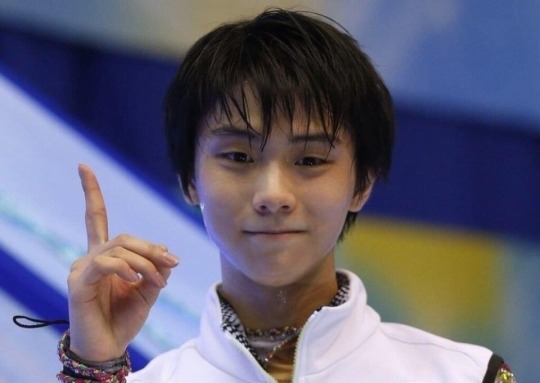
Continuing Kikuchi-san's book 'Strongly, beautifully.....'
If you have not read all 6 parts of Chapter 1, please read them first. See my previous posts in tumblr, OR the master post on FB.
Chapter 2, part 1. Fukuoka GPF, 1st time with ID pass
Yuzuru who became a World Championship medalist at just 17 years of age, moved to the Cricket Club in Toronto, Canada. This prominent club, headed by the famous Brian Orser, has choreographers and instructors for land training. In such a unique and favourable environment, Yuzuru continued his training.
After this move across the ocean, he came to my place here about a few times a year. It also had the feeling of coming to greet me upon returning to his hometown.
In the Sochi Olympic season of 2013-14, I received an email from Yuzuru. It was 3 weeks before the 2013 December Grand Prix Final, held in Fukuoka.
"Sensei, can you help me? Can you please be my trainer at GPF Fukuoka?"
His team has a specialised trainer. For the GP series competitions that had just taken place in Canada and France, that trainer had gone with them. I expressed this thought to him.
"There are always some areas that don't go very smoothly, please come and take a look," he replied me by email.
I thought it would be like Rostelecom Cup last time, just help him do taping in the hotel room, but this time he wanted me to go to the venue and see the situation closely.
Because it was a competition in Japan, I thought it was just for this one time, so I agreed, "I know, I know. I will be there."
When I met up with Yuzuru in Fukuoka, I listened to his description; it seemed that he felt there was something wrong with the warm-up exercises.
In figure skating, before putting on skates to compete, there are about 60 minutes of warm-up time. Having listened to suggestions from various people, and also with other skaters' exercises as reference, Yuzuru seemed to have created his own menu of warm-up based on that foundation.
But in recent competitions, the adjustment just before competing did not go that smoothly. I had readily accepted his request to be there, with the words "I know, I know", but now I was in trouble. After all, I only knew about the warm-up for martial arts competitions. For me, before Shorinji Kempo competitions, I usually did some running and low intensity muscle training, just to warm up the body. And also relaxing the muscles and joints to help to prevent injuries. One more thing is to raise the tension level (t/n. or hype yourself up). Going forward to the competition area with the feeling of "I'll show you all some colour*, I'll show you how it's done". That is to say, rousing to an imposing manner is very important.
*(t/n. "Show you some colour" in Chinese is usually said before you beat someone up, haha.)
But, is this way of warming up suitable for figure skating.......With this kind of questions in my mind, I thought about the pre-competition warm-up for Yuzuru.
For me this time, it was different from Rostelecom Cup 2 years ago because I had the ID pass, I could enter the rink side with the athletes, and also places like the warm-up zone and rest area.
"Do you know why we need to warm up? It's to prevent injury," I said to Yuzuru as I instructed him on warming-up exercises, like jogging, sprinting and jumping side to side.
In that warm-up zone, there was also Patrick Chan, running quietly. He was the world's number one figure skater at that time, a first-rate skater that even someone like me who knew nothing about figure skating had heard of him. I felt we may be able to learn many things from a top skater's warm-up, so I observed him earnestly from the side.
Despite using a warm-up method that was suitable for martial arts, Yuzuru broke the world record for the short programme score at this competition. He was also first for free skating, and he conquered GPF for the first time.
Translated by me from Chinese translation by QuailAries@weibo
Photo above: Taken in the K&C of GPF 2013, credits unknown.
-------------------
Chapter 2, part 2. Trainer for 1st Olympics
After this, in the same month, Yuzuru competed in the Japanese National Championships. It was held in Saitama Super Arena, and was also the selection event for representatives to Sochi Olympics the next year.
Even though it was an important competition that involved Olympic entry, Yuzuru seemed very relaxed. Perhaps he had gained confidence from his victory over the king, Patrick Chan, in GPF Fukuoka.
Yuzuru won the Japanese nationals, and the next day, the Olympic team was announced. (t/n. skaters' names omitted)
"Honestly, I'm very happy. But this is just the start line," Yuzuru said this to the media after it was confirmed that he would be going for his first Olympics.
It's so amazing. From the time he was an elementary school student, he has been saying, "I want to compete in the Olympics." Even when I said, "(You're) so noisy, keep quiet for the massage!", he still went on and on, "Olympics, Olympics." Now, that dream had come true.
(Photo below: 23 Dec 2013 Japan nationals, when the Olympic reps were announced. Kanako Murakami and Yuzuru, both just turned 19, were part of the team.)
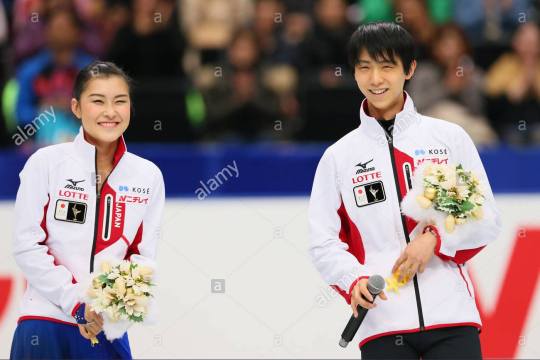
For the big stage from here on, the Canadian trainer in Yuzuru's team would take charge. This time really, "my work ends here". With these thoughts, I returned to Sendai.
Then this happened a few days later. Out of the blue, Yuzuru's father came to my clinic and handed me a piece of paper, saying, "Please, may we have your help." ("onegaishimasu")
"What's the matter?" I thought and I looked at the paper; it was a registration form for the size of blazer, sportswear and such, for the Olympic delegation.
"We hope you can go along for the Olympics. Although it will take up a long period of about one month......" he made this request. I replied in a panic, "Wait a minute, wait, why me?"
I had joined the team for GPF and nationals, but they were all competitions within Japan. Overseas, international competitions, and something as huge as the Olympics, it's better to have a specialised trainer, I was thinking. Hence, I could not give an immediate reply.
Nevertheless, he said to me, "Sensei, by all means, please."
Translated by me from the original Japanese book by Akira Kikuchi.
(I ordered the book on Amazon Japan and it arrived at the time I was starting to translate this part)
Please consider buying the book if you can; give some support. :)
Photos in my posts are not from the book. I chose them from the internet.
#Akira Kikuchi#Yuzuru Hanyu#corrected one part: not Shaolin Kungfu but Shorinji Kempo#Japanese martial arts inspired by Shaolin kungfu
89 notes
·
View notes
Photo
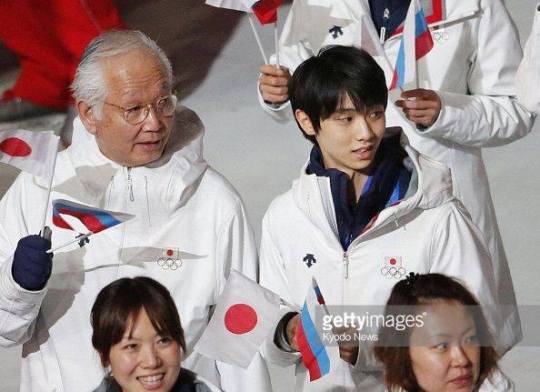
Continuing Kikuchi-san's book 'Strongly, beautifully,....'
If you have not read the earlier parts, please read them first. See my previous posts in tumblr, OR the master post on FB.
Chapter 2, parts 3 and 4 and 5: the relaxed athlete and the anxious trainer at Sochi (t/n. this is my own summarised title of the 3 parts)
(For these parts, I summarised or left out some sentences that are not so important to the main storyline.)
At Sochi Olympics, Yuzuru was in the team event and the singles event.
That child had just turned 19, there was no pressure, and he did not know fear. My job was to instruct and assist him for the warm-up. And also, icing and body care after the performance.
Just like how choreography and costumes were clearly separated and taken care of by different people, taking care of the skater's body was the trainer's job. Coach Brian did not give me any concrete instructions and he did not say anything about Yuzuru's warm-up. I also did not interfere with figure skating techniques. Anyway, I could not give any advice for that. It was only my 4th time watching it at the venue. And only my 2nd time at an overseas competition.
Even so, I could feel the enormity of the Olympics. I felt the pressure of this huge stage. I saw it in the faces of the athletes. However, Yuzuru did not seem to feel much pressure. He looked quite relaxed.
-------------------
The Sochi Olympics that Yuzuru faced in a relaxed manner, for me it was a series of big failures.
Firstly, when I made the warm-up plan for Sochi, I used Patrick Chan's methods as reference, but it was totally not suitable for Yuzuru. Before official practice, he tried the warm-up programme that I had planned, and he became short of breath. The reason is simple: there was too big a difference in stamina between Patrick Chan and Yuzuru at that time. I realised that the warm-up which was effective for Patrick who was full of stamina, could not be used at all by Yuzuru.
Right up to the team event competition, I was discussing with Yuzuru and hurriedly making a new warm-up plan; it was extremely poor support.
Speaking of poor support, the sports tape that is like the tool of my trade, became insufficient; this is such a big mistake that if I were to be disqualified as a trainer because of this, I have nothing to say. Normally, Yuzuru practised once a day. But at Sochi, he skated at the rink twice a day. Each time he wore his skate boots, the taping would be done again. With more practice sessions, the tape I brought from Japan was quickly used up.
To buy the tape, I ran around the streets of Sochi. I was looking for medical shops or sports shops but the signs were all in Russian and could not be quickly understood. I went into shops that looked like they would sell tape but I could not convey "please give me sports tape". I used English and gestures, and somehow managed to buy some tape, but still the amount was not enough.
That kind of farce probably reached the ears of the Japan Skate Federation people. "We will get the tape, so (you can focus on) supporting the athlete please."
I should have discussed with JSF staff right from the start. I was too anxious and totally unable to see what was around me.
----------------
An important duty of the trainer is to get the skater's mental state ready. However, at Sochi, I kept disturbing Yuzuru's state of mind. My biggest mistake was on the morning of the free skate. For the short programme on the previous day, he had successfully made all the jumps and achieved a world record score of 101.45. He was in first place. Next, the free skate was coming up.
Official practice for the free skate was at 10am. Considering the warm-up time needed, we would leave the Athletes' Village at 8am. Before that, taping was needed, so I would have to go to Yuzuru's room at 7.30am.
However, Yuzuru's performance for the SP was too perfect and when I thought about the FS coming up, my heart started pounding..... I could neither sit nor stand, and in the end, I left my room. I reached Yuzuru's room 40 minutes ahead of time.
"Oh~, sensei, what's the matter? You're very early," he said.
"I want to do a good job (with the taping) so I came over earlier," I made an excuse like that. Frankly speaking, my usual self was already lost.
After the SP, there was a press conference which ended late. By the time Yuzuru was back in his room, it was middle of the night, past 1am. I should have let him rest a bit more, but I said, "Alright, let's do the taping."
"Eh? Now??"
My self of that moment paid no attention. "What to do, what to do," I was panicking by myself and becoming flustered.
Yuzuru was trying his best to maintain his normal state of mind, so that he would not be swallowed up by the Olympic demon, that is, the atmosphere that prevents one from showing his usual abilities. His trainer who was supposed to be his ally, was actively being an obstacle to his efforts. I do not think that my actions gave him any good influence at all. In any case, my self at Sochi Olympics had lost all common sense.
-------------
Translated by me from Japanese book by Akira Kikuchi-san: https://www.amazon.co.jp
(next: last parts of chapter 2, coming soon)
68 notes
·
View notes